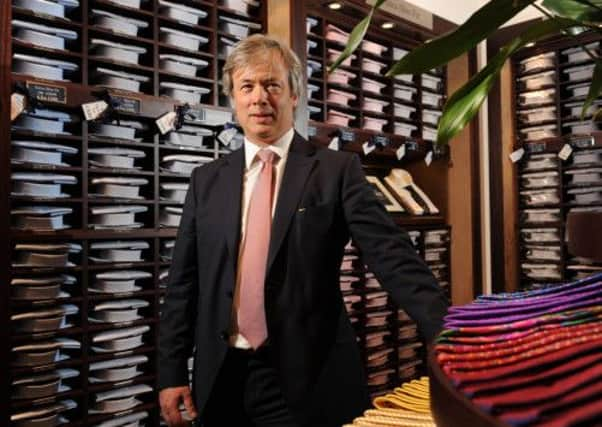Retail veteran praises quality of the region’s textile industry


Nick Wheeler said his suppliers make “beautiful” fabrics “at a great price” and help him to run a successful fashion business in an economic downturn.
The company’s suit fabrics and tweeds are woven in Leeds and Guiseley and finished in Huddersfield.
Advertisement
Hide AdAdvertisement
Hide Ad“All you hear about is gloom and doom in British manufacturing and the good old traditional British industries,” said Mr Wheeler during a visit to his new store in Leeds.
He added: “It’s great to see factories that are world leaders in what they do and competing on the world stage.”
Mr Wheeler said the British tend to talk down the domestic manufacturing industry, which undermines the confidence of businesses in the sector, despite UK firms offering better quality.
“The finishing on the fabric is as good as, if not better, than the Italians who are known for their finishing and far better than you get out in the Far East,” he added.
Advertisement
Hide AdAdvertisement
Hide Ad“They have been doing it for hundreds of years; they really know what they’re doing; they understand it and we get a fantastic product from them at a great price.”
Mr Wheeler said his suppliers give him a competitive advantage over his rivals.
Alongside suit fabrics, the company also makes shoes, ties, cufflinks and socks in the UK. Suit and shirt production is overseas.
Mr Wheeler said: “The shirt industry in the UK has pretty much died. There are very few people left on Jermyn Street who still make shirts in the UK.”
Advertisement
Hide AdAdvertisement
Hide AdJermyn Street, in central London, is known for its resident shirtmakers. Charles Tyrwhitt chose the location for its first store in 1997.
Mr Wheeler said his customers often ask for more British-made products. He is looking at bringing more production back to the UK but said any decisions would have to have a sound commercial basis.
He said: “I would love to make everything in the UK. I love the idea of it. But making everything in the UK becomes very difficult, especially for shirts. We offer four shirts for £100.
“I say if you want me to make shirts in the UK I will do that but I will charge you £110 a shirt.”
This would make the company less competitive, he said.
Advertisement
Hide AdAdvertisement
Hide AdMr Wheeler added: “There is an advantage to having it made in the UK where you get a quick turnaround. What you need for that are really efficient manufacturers. That’s something people are waking up to more in this country.”
Suppliers have to be able to offer a fast turnaround and great service, he said.
UK manufacturing is undergoing a revival of sorts, although it is still dwarfed by the UK’s powerhouse service sector.
Mr Wheeler said: “Manufacturing is a global thing; stuff is made all over the world and as different economies develop at a different pace and the cost of manufacturing changes in different countries at different times and there is a general shift back into Europe and into the UK.”
Advertisement
Hide AdAdvertisement
Hide AdHe said India and China are becoming more expensive for manufacturing. Bangladesh, one of the cheapest locations, became the focus of international concern this week after a garment factory supplying Primark collapsed and killed nearly 230 workers.
Mr Wheeler described the incident as “terrible” and “just awful”. “Manufacturers have to be responsible,” he said.
He added that his eastern European factories are modern, air-conditioned, independently inspected and are better than some he has seen in the UK.
The multi-channel retailer formally opened its 21st store on Thursday evening with a champagne party for mail-order customers and the media.
Advertisement
Hide AdAdvertisement
Hide AdMr Wheeler, a 48-year-old Old Etonian, founded the business making shirts with Yorkshire fabrics in 1986, while still at Bristol University.
Last year the company had sales of £105m and reported a pre-tax profit of £12m. Half of its turnover came from the overseas operations in the United States and Germany.
Shirts make up half of sales, with suits, shoes, ties and accessories making up the rest. More than 70 per cent of sales come from the long-established mail order business.
Mr Wheeler appointed Greg Hodder, the former managing director of Direct Wines, as chief executive in 2008.
Advertisement
Hide AdAdvertisement
Hide AdMr Hodder and the new retail director Ian Shaw, a product of Ilkley Grammar School, attended the launch at Trinity Leeds this week.
Mr Wheeler said: “I don’t want to have hundreds of stores. I just want to have stores in central regional locations that have a big catchment for us.”